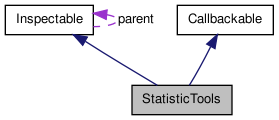StatisticTools Class Reference
TODO: add possibility to pass description of a measure. More...
#include <statistictools.h>
Inherits Inspectable, and Callbackable.

Public Member Functions | |
| StatisticTools (const std::string &name="StatisticTools") | |
| virtual double & | addMeasure (double &observedValue, const char *measureName, MeasureMode mode, long stepSpan, double additionalParam=0) |
| adds a variable to observe and measure the value | |
| virtual StatisticMeasure * | getMeasure (double &observedValue, const char *measureName, MeasureMode mode, long stepSpan, double additionalParam=0) |
| Same as the method above, but instead of getting the calculated value back (the adress), you get the StatisticMeasure itself. | |
| virtual double & | addMeasure (AbstractMeasure *measure) |
| You can add another abstract measure you like. | |
| virtual double & | addMeasureList (std::list< AbstractMeasure * > measureList) |
| You can add another abstract measure you like. | |
| virtual double & | addMeasureList (std::list< ComplexMeasure * > measureList) |
| You can add another abstract measure you like. | |
| virtual double & | addMeasureList (std::list< StatisticMeasure * > measureList) |
| You can add another abstract measure you like. | |
| virtual void | beginMeasureAt (long step) |
| starts the measure at a specific time. | |
| virtual bool | measureStarted () |
| Tells you wether the measures have already been started. | |
| virtual void | doOnCallBack (BackCaller *source, BackCaller::CallbackableType type=BackCaller::DEFAULT_CALLBACKABLE_TYPE) |
| CALLBACKABLE INTERFACE. | |
Protected Attributes | |
| std::list< AbstractMeasure * > | activeMeasures |
| long | beginMeasureCounter |
Detailed Description
TODO: add possibility to pass description of a measure.
Constructor & Destructor Documentation
| StatisticTools | ( | const std::string & | name = "StatisticTools" |
) | [inline] |
Member Function Documentation
| double & addMeasure | ( | AbstractMeasure * | measure | ) | [virtual] |
You can add another abstract measure you like.
in some cases (e.g. complex measures) it is better to let the measure decide how it likes to be initialized
- Parameters:
-
measure the measure to add
- Returns:
- the address value of the measure
| double & addMeasure | ( | double & | observedValue, | |
| const char * | measureName, | |||
| MeasureMode | mode, | |||
| long | stepSpan, | |||
| double | additionalParam = 0 | |||
| ) | [virtual] |
adds a variable to observe and measure the value
- Parameters:
-
observedValue the value to observe. measureName the name of the measured value mode the mode of measure stepSpan in most cases the stepSpan is important to get the measured value of a number of steps, like AVG: if stepSpan = 0, AVG is calculated over all steps if stepSpan = n, AVG is calculated over the LAST n steps The same counts for all the other MeasureModes. additionalParam is used for example for mode PEAK, the param is the limit value, all values minus limit are displayed, values below the limit are set to 0. In CONV mode (test the convergence), this value is the epsilon criteria.
- Returns:
- measured value as adress. So it is possible to measure this value again
| double & addMeasureList | ( | std::list< StatisticMeasure * > | measureList | ) | [virtual] |
You can add another abstract measure you like.
in some cases (e.g. complex measures) it is better to let the measure decide how it likes to be initialized With this method you can add a list of AbstractMeasures.
- Parameters:
-
measureList the list of measures to add
- Returns:
- the address value of the first measure
| double & addMeasureList | ( | std::list< ComplexMeasure * > | measureList | ) | [virtual] |
You can add another abstract measure you like.
in some cases (e.g. complex measures) it is better to let the measure decide how it likes to be initialized With this method you can add a list of AbstractMeasures.
- Parameters:
-
measureList the list of measures to add
- Returns:
- the address value of the first measure
| double & addMeasureList | ( | std::list< AbstractMeasure * > | measureList | ) | [virtual] |
You can add another abstract measure you like.
in some cases (e.g. complex measures) it is better to let the measure decide how it likes to be initialized With this method you can add a list of AbstractMeasures.
- Parameters:
-
measureList the list of measures to add
- Returns:
- the address value of the first measure
| void beginMeasureAt | ( | long | step | ) | [virtual] |
starts the measure at a specific time.
This is useful if there are values that have to be ignored at simulation start.
- Parameters:
-
step number of steps (normally simsteps) to wait for beginning the measures
| void doOnCallBack | ( | BackCaller * | source, | |
| BackCaller::CallbackableType | type = BackCaller::DEFAULT_CALLBACKABLE_TYPE | |||
| ) | [virtual] |
CALLBACKABLE INTERFACE.
this method is invoked when a callback is done from the class where this class is for callback registered
Implements Callbackable.
| StatisticMeasure * getMeasure | ( | double & | observedValue, | |
| const char * | measureName, | |||
| MeasureMode | mode, | |||
| long | stepSpan, | |||
| double | additionalParam = 0 | |||
| ) | [virtual] |
Same as the method above, but instead of getting the calculated value back (the adress), you get the StatisticMeasure itself.
| virtual bool measureStarted | ( | ) | [inline, virtual] |
Tells you wether the measures have already been started.
- Returns:
- true if measures have already been started, otherwise false
Member Data Documentation
std::list<AbstractMeasure*> activeMeasures [protected] |
long beginMeasureCounter [protected] |
The documentation for this class was generated from the following files:
 1.6.3
1.6.3